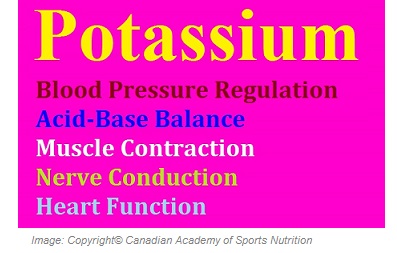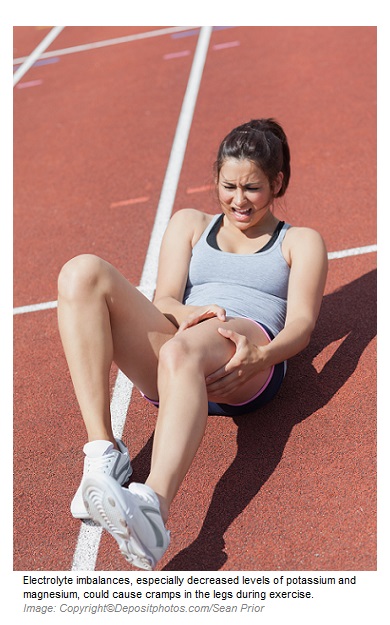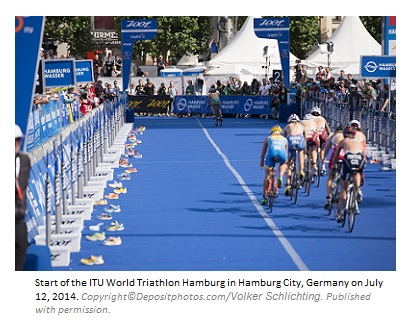Potassium is one of the most important electrolytes in the body. Electrolytes  are the minerals that ionize when dissolved in water and can conduct an electric current. It is the major cation (positive ion) within the cells (intracellular) and has a key role in regulating blood pressure, controlling water and acid – base balances, conducting nerve impulses, controlling muscle contraction, and maintaining normal heart function.
are the minerals that ionize when dissolved in water and can conduct an electric current. It is the major cation (positive ion) within the cells (intracellular) and has a key role in regulating blood pressure, controlling water and acid – base balances, conducting nerve impulses, controlling muscle contraction, and maintaining normal heart function.
Food Sources and Absorption of Potassium:
The total amount of potassium in the body is 50 mEq (milliequivalent) per one kilogram of body weight. Therefore, a person with body weight of 70 kg has about 3500 mEq (120 gram) of potassium in the body, of which 98% is inside the cells and 2% is outside the cells.
Dietary potassium is absorbed efficiently (90%) from the small intestine, and the kidneys are that main regulators of potassium. In a healthy person, the entire daily intake of potassium is excreted, approximately 90% in the urine, 10% in the stools, and a very small amount in the sweat.
Potassium can be found in many foods (see the table below). Potassium is easily lost in cooking, processing or canning foods, and even in freezing fruits and vegetables.
|
Foods Rich in Potassium: |
||
|
Foods |
Serving Size |
Potassium (mg) |
|
Tomato paste |
1 cup |
2600 |
|
Beet greens, cooked |
1 cup |
1300 |
|
Dates |
1 cup |
1170 |
|
Raisins |
1 cup |
1080 |
|
Soybeans, cooked |
1 cup |
970 |
|
Lima beans, cooked |
1 cup |
945 |
|
Fish, halibut |
5 oz |
900 |
|
Fish, tuna |
5 oz |
900 |
|
Plantain, raw |
One, medium |
895 |
|
Spinach, cooked |
1 cup |
840 |
|
Papaya |
One, medium |
780 |
|
Lentils, cooked |
1 cup |
730 |
|
Kidney beans, cooked |
1 cup |
710 |
|
Navy, cooked |
1 cup |
705 |
|
Sweet potato, cooked |
One, medium |
700 |
|
Artichoke, raw |
1 cup |
640 |
|
Baking potato, cooked |
One, medium |
620 |
|
Black beans, cooked |
1 cup |
610 |
|
Fish, haddock |
5 oz |
600 |
|
Fish, salmon |
5 oz |
580 |
|
Yogurt |
1 cup |
580 |
|
Parsnip, cooked |
1 cup |
570 |
|
Pumpkin, cooked |
1 cup |
560 |
|
Mushroom, cooked |
1 cup |
555 |
|
Brussels sprouts, cooked |
1 cup |
495 |
|
Broccoli, cooked |
1 cup |
460 |
|
Cantaloupe |
1 cup |
430 |
|
Banana |
One, medium |
425 |
|
Apricots |
10 halves |
410 |
The normal range of potassium in the blood is 3.5 – 5.5 mEq/L. Potassium depletion may cause muscle weakness, cramps, paralytic episodes, irregular heartbeats (cardiac arrhythmias), rhabdomyolysis, impaired glucose tolerance, polydipsia (excessive thirst) and polyuria (excessive urination).
Athletic Benefits of Potassium:
The heart, skeletal muscles, and intestinal smooth muscles are very sensitive to the fluctuations of potassium in the blood. Therefore, small variations in potassium levels could affect the normal functions of the heart and skeletal muscles in athletes and physically active people. The potential benefits of potassium in athletes are:
- May help prevent post – exercise exhaustion.
- Supports intense training sessions.
- Aids maintain normal levels of growth hormone (GH) and IGF – I, which are important for muscle growth and optimum athletic performance. For more information about IGF – I, see “IGF – I ” under the section of “GH Enhancers”).
- May have a protective effect against post – exercise rhabdomyolysis.
- May help prevent cramps during and after intense exercise.

- Is important in replenishing glycogen stores by helping conversion of glucose to glycogen.
Non – Athletic Benefits of Potassium:
The following conditions may benefit from potassium:
- High blood pressure.
- Kidney stones.
- Premenstrual syndrome (PMS).
- Chronic diarrhea.
- Infantile colic (as potassium chloride).
- Chronic fatigue syndrome.
- Dehydration.
- Weight management.
- Along with diuretics.
Dosage and Side Effects:
The daily requirement for potassium for non – athlete adults is 1500 – 2000 mg. The performance daily intake (PDI) for potassium for athletes and physically active adults is 2500 – 3500 mg.
Potassium is available as potassium chloride, citrate, fumarate, and gluconate. Potassium pills may cause stomach upset and esophagitis (inflammation of the esophagus).
Potassium supplementation should be avoided in the following conditions:
- Chronic kidney disease.
- Kidney failure.
- Congestive heart failure.

- Adrenal gland insufficiency.
- Addison`s disease.
- Post – exercise rhabdomyolysis.
Interactions:
The potential interactions of potassium are as follows:
- The supplements and medications that may decrease potassium levels in the blood are:
- Caffeine.
- Vitamin B12.
- Folic Acid.
- Licorice.
- Insulin.
- Laxatives.
- Diuretics.
- Corticosteroids.
- Catecholamines (epinephrine, dopamine, and albuterol).
- Theophylline.
- Penicillin derivatives (penicillin, nafcillin, ticarcillin, dicloxacillin, oxacilin, and carbenicillin).
- The supplements and medications that may increase potassium levels in the blood are:
- Arginine.
- Lysine.
- Potassium – sparing diuretics (spironolactone, amiloride, and triamterene).
- Angiotensin converting enzyme (ACE) inhibitors (captopril, enalapril, lisinopril, and ramipril).
- Digoxin.
- Nonsteroidal anti- inflammatory drugs (NSAIDs) such as Advil.
- Beta – blockers.
- Cyclosporine.
- Heparin.
- Tacrolimus.

